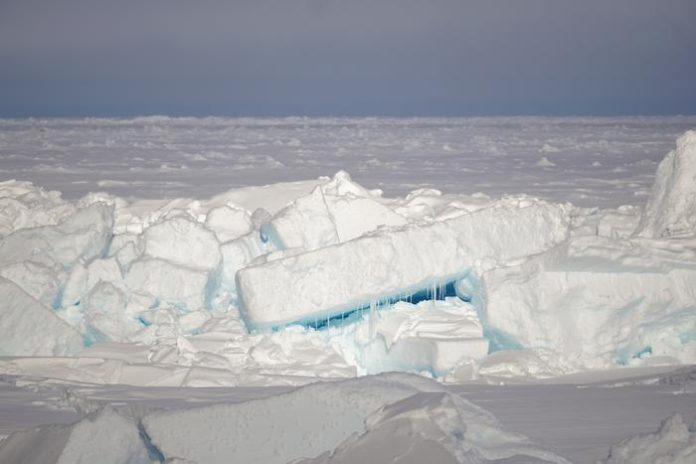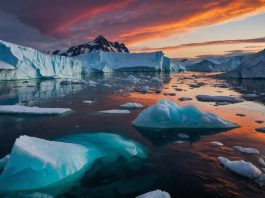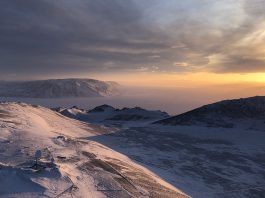Across the Arctic, multiyear ice is increasingly melting, dramatically reducing the frequency and size of Arctic pressure ridges.
Arctic pressure ridges are created when ice floes press against each other and become stacked. They are a characteristic feature of Arctic sea ice, an obstacle for shipping, and an essential component of the ecosystem.
In a new study, experts from the Alfred Wegener Institute reported on this trend and analysed observational data from three decades of aerial surveys.
Satellite data from the last three decades documents the dramatic changes in Arctic sea ice due to climate change: the area covered in ice in summer is declining steadily, and the floes are becoming thinner and moving faster.
Until recently, it was unclear how the characteristic pressure ridges had been affected since it’s only been possible to reliably monitor them from space for the past few years.
The role of Arctic pressure ridges in the frozen north
Arctic pressure ridges are produced by lateral pressures on sea ice. Wind or ocean currents can stack floes up, forming metre-thick ridges. The part of the ridges – which break up the otherwise smooth surface of the ice every few hundred metres – extending above the water is called the sail and measures between one and two metres.
Even more impressive is the keel below the water line, which can extend down to 30 metres and create an impassable obstacle for shipping.
Pressure ridges affect not only the energy and mass balance of the sea ice but also the biogeochemical cycle and the ecosystem – when their sails catch the wind, floes can be driven all across the Arctic. Polar bears use pressure ridges as a source of protection for overwintering or birthing their young.
In addition, the structures offer protection to ice-associated organisms at various trophic levels and promote the turbulent mixing of water, which increases nutrient availability.
Analysing changes in the ridges
A team of researchers from the Alfred Wegener Institute, Helmholtz Centre for Polar and Marine Research (AWI), has now reprocessed and analysed laser-based readings gathered in 30 years of research flights over the Arctic ice.
The survey flights, which cover a total distance of roughly 76,000 kilometres, show for the first time that the frequency of Arctic pressure ridges north of Greenland and in Fram Strait is decreasing by 12.2% and their height by 5% per decade.
Data from the Lincoln Sea, an area where particularly old ice is known to accumulate, paints a similar picture. Here, the frequency is declining by 14.9% and the height by 10.4% per decade.
“Until now, it’s remained unclear how pressure ridges were changing,” explained Dr Thomas Krumpen, a sea-ice expert at the AWI and the study’s main author.
“More and more of the Arctic consists of ice that melts in the summer and is no more than a year old. This young, thin ice can more readily be deformed and more rapidly forms new pressure ridges.”
He continued: “The fact that pressure ridges are nonetheless in decline is due to the dramatic melting of older floes.
“The loss of this multiyear ice is so severe that we’re observing an overall decline in pressure-ridge frequency, even though the thin young ice is easier to deform.”
How the changes affect the overall Arctic ecosystem
To draw conclusions regarding Arctic-wide changes, the researchers combined all observational data to develop a metric. Then, with the aid of satellite data, they applied it to the Arctic as a whole.
However, to estimate the direct effects of the observed changes on the Arctic ecosystem, models need to be developed to reflect both physical and biological processes in sea ice of various ages.
Although we know that pressure ridges are home to a range of organisms, we still lack a deeper understanding of the role of pressure-ridge age.
Yet this aspect is especially important, as the percentage of ridges that don’t survive their first summer is on the rise.
AWI sea-ice physicist Dr Luisa von Albedyll, who contributed to the study, said: “Actually, the ice should drift more slowly when the sails shrink since there’s less area for the transfer of momentum.
“This indicates that other changes are producing just the opposite effect. Stronger ocean currents or a smoother ice underside due to more intensive melting could be contributing factors.
She concluded: “To answer these open questions and gain a better grasp of the complex interrelationships, we have made the entire dataset available in a public archive, ensuring that other researchers can use it and integrate it into their studies.”
Future areas for research
An expedition with the research vessel Polarstern is planned for next summer, focusing on investigating the biological and biogeochemical differences between floes and Arctic pressure ridges of different ages and provenances.
At the same time, there will be extensive aerial survey flights with the research aircraft.
According to Krumpen, the combination of observations will provide better insights into the complex interactions between the sea ice, climate and ecosystem.





